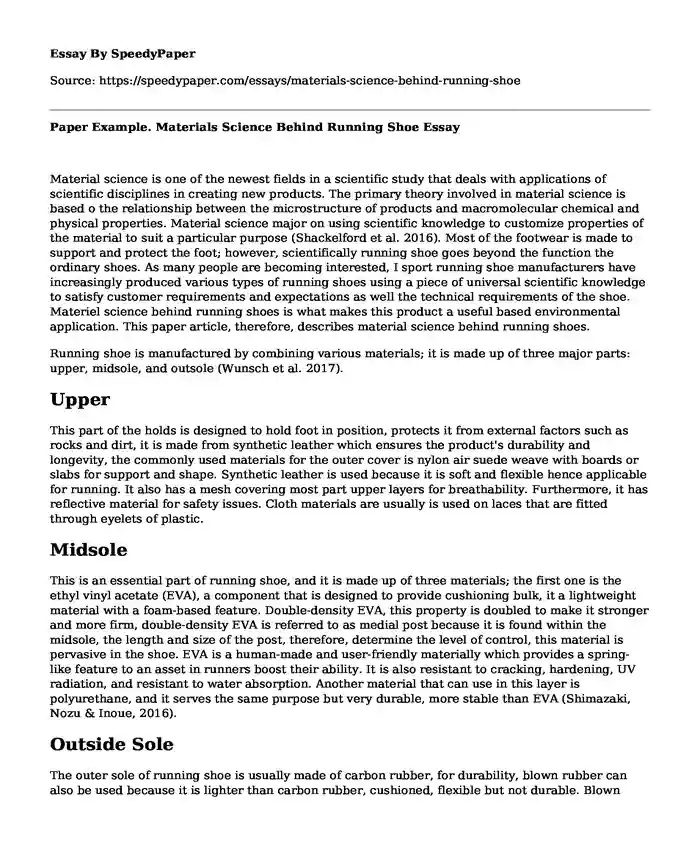
| Type of paper: | Article |
| Categories: | Knowledge Engineering Chemistry Sport |
| Pages: | 3 |
| Wordcount: | 614 words |
Material science is one of the newest fields in a scientific study that deals with applications of scientific disciplines in creating new products. The primary theory involved in material science is based o the relationship between the microstructure of products and macromolecular chemical and physical properties. Material science major on using scientific knowledge to customize properties of the material to suit a particular purpose (Shackelford et al. 2016). Most of the footwear is made to support and protect the foot; however, scientifically running shoe goes beyond the function the ordinary shoes. As many people are becoming interested, I sport running shoe manufacturers have increasingly produced various types of running shoes using a piece of universal scientific knowledge to satisfy customer requirements and expectations as well the technical requirements of the shoe. Materiel science behind running shoes is what makes this product a useful based environmental application. This paper article, therefore, describes material science behind running shoes.
Running shoe is manufactured by combining various materials; it is made up of three major parts: upper, midsole, and outsole (Wunsch et al. 2017).
Upper
This part of the holds is designed to hold foot in position, protects it from external factors such as rocks and dirt, it is made from synthetic leather which ensures the product's durability and longevity, the commonly used materials for the outer cover is nylon air suede weave with boards or slabs for support and shape. Synthetic leather is used because it is soft and flexible hence applicable for running. It also has a mesh covering most part upper layers for breathability. Furthermore, it has reflective material for safety issues. Cloth materials are usually is used on laces that are fitted through eyelets of plastic.
Midsole
This is an essential part of running shoe, and it is made up of three materials; the first one is the ethyl vinyl acetate (EVA), a component that is designed to provide cushioning bulk, it a lightweight material with a foam-based feature. Double-density EVA, this property is doubled to make it stronger and more firm, double-density EVA is referred to as medial post because it is found within the midsole, the length and size of the post, therefore, determine the level of control, this material is pervasive in the shoe. EVA is a human-made and user-friendly materially which provides a spring-like feature to an asset in runners boost their ability. It is also resistant to cracking, hardening, UV radiation, and resistant to water absorption. Another material that can use in this layer is polyurethane, and it serves the same purpose but very durable, more stable than EVA (Shimazaki, Nozu & Inoue, 2016).
Outside Sole
The outer sole of running shoe is usually made of carbon rubber, for durability, blown rubber can also be used because it is lighter than carbon rubber, cushioned, flexible but not durable. Blown rubber is a soft material and air-injectable component. This material provides traction ability on wet surfaces hence reducing chances of slipping while running.
Ranking Table
| Material Rank | Reason for application |
| Ethylene-Vinyl Acetate Midsole | Light for smooth running, cushioned foam-based for protection |
| Synthetic Leather Upper layer | Light, flexible and durable |
| Mesh Cloth Upper layer | Breathability to keep the foot dry at all times |
| Carbon Rubber Outsole | It is durable, flexible, and light |
References
Shackelford, J. F., Han, Y. H., Kim, S., & Kwon, S. H. (2016). CRC materials science and engineering handbook. CRC press.
Shimazaki, Y., Nozu, S., & Inoue, T. (2016). Shock-absorption properties of functionally graded EVA laminates for footwear design. Polymer Testing, 54, 98-103.
Wunsch, T., Kroll, J., Stoggl, T., & Schwameder, H. (2017). Effects of a structured midsole on spatio-temporal variables and running economy in the overground running. European journal of sports science, 17(3), 303-309.
Cite this page
Paper Example. Materials Science Behind Running Shoe. (2023, Mar 14). Retrieved from https://speedypaper.com/essays/materials-science-behind-running-shoe
Request Removal
If you are the original author of this essay and no longer wish to have it published on the SpeedyPaper website, please click below to request its removal:
- The Airplane Crash - Free Essay for You
- Free Essay on Mesoamerican Religious Beliefs and Practices
- Free Essay on Whether Flexible Working Hours Foster Teamwork
- Comparison Essay Sample: Healthcare System in the U.S. and Japan
- Free Essay Sample about Teenage Female Sexual Exploitation
- Marketing Essay Example on Customer Lifetime Value
- Free Essay. Globalization: Empires of the Atlantic World: Britain and Spain in America
Popular categories




